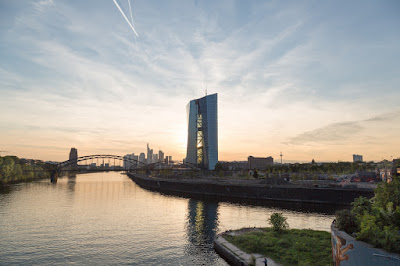 |
| The headquarter of the European Central Bank at Frankfurt am Main (Source: ECB) |
It all started on 1st June 1998. The
rules agreed in the Maastricht Treaties for the establishment of a
European central bank and the introduction of a common currency, the
EURO, came into force. For the past twenty years, the common central
bank of many European Union countries has at the same time been a
rescuer in times of need and a goal, of ongoing sharp criticism. We
went out in search for what constitutes this globally unique
supranational institution at its core.
 |
| Robert Heyes a travel experienced British works in the payment department. A core function (Source: Thomas Seidel) |
The 1990s brought the world the
hitherto most comprehensive reorganization of the post-war world.
With the reunification of Germany disappeared the old line of
confrontation of the Cold War. Above all, the communication
technology made unimaginable rapid progress. Everyone is virtually
connected to everyone thanks to the Internet. Today, worldwide
logistics quickly deliver any demanded goods to all desired
locations. A liberalized finance industry provided almost infinite
funding for investment and consumption.
 |
| Akuvie Edzave the family is from Togo. Organizing travels for her colleagues in a polyglot way (Source: Thomas Seidel) |
An economically fragmented nationalist
Europe would not have been competitive in the rush of global trade.
Reason enough for Europe to unite ever deeper and closer. It started
with a monetary and banking union. It should be followed by a tax and
social union. At least in economic terms, a kind of United States of
Europe. So far only the EURO and the European Central Bank (ECB) have
been realized.
 |
| Patricia Kern-Endres from Ireland is the 49th employee. Today she is working at the president office (Source: Thomas Seidel) |
More than just a central bank
This largely unfinished European Union
project has imposed a responsibility on the ECB that was not intended
for the purpose of a central bank. But of all the European
institutions, the ECB is the only one that has the impression to the
European people that it really works. You may or may not agree with
the decisions of the ECB committees. But if a decision has been made,
it will be implemented immediately and effectively. The ECB is not
just moving billions of euros. It promotes or slows down the economy,
it creates a global competitive framework for the European economy
and sometimes also saves its own currency or the dilapidated national
budgets of entire member countries. But all this only in the context
of their original mission (original Mario Draghi: "within our
mandate").
 |
| Beverley Standon left Great-Britain 20 years ago to work at the ECB. Today she is a compliance- officer (Source: Thomas Seidel) |
The ECB was usually taken by surprise
by politics a few years ago with the additional task of being the
supreme banking regulator in Europe alongside monetary policy. Nobody
in the ECB wanted that at the time. Many outside the ECB had and
still have doubts as to whether the ECB is thus permanently in a
depleting conflict of interest. But the policy had no choice. Very
quickly, a competent and effective European banking supervisory
authority had to be established from the scratch. To do that at all
could only be trusted by the ECB. It is therefore fair to say that
the choice of this decision is the largest vote of confidence in the
ability of the central bank to date. But ultimately, the project of a
European central bank and years later of European banking supervision
was successful only because all the staff of the ECB had the
competence, the skills and the will to successfully implement both
powerful projects.
 |
| Conception Alonso is of Portoguese origin, but grew up in France. She takes care of investments of the ECB in foreign currencies (Source: Thomas Seidel) |
Only Europe is true
It must have been at the time of the
first President of the ECB, Wim Duisenberg, that the employees
developed that awareness of being part of this supranational
institution, and that, at least for their work, their national origin
occasionally takes a back seat. What is the current central bank
policy, decide the overall interests of all member countries of the
EURO-Community, but indirectly also all countries of the EU. This
overall interest must be kept in mind by the ECB, never only by the
interests of individual states or smaller groups of states. This is a
balancing act, which is not always easy to understand for some large
but also small member countries.
 |
| Eva Finkernagel-Eid is one of the longest serving employees within the ECB. She studied banking business and multilingual secretary and keeps contact to the media |
Despite severe elemental crises, the
ECB has still succeeded in maintaining its share of the European
project. Meanwhile, some go so far as to say that should the EURO and
the ECB collapse, Europe will fall apart too. That may sound a bit
drastic. For the future, however, one should wish the European
Central Bank to concentrate only on its very own tasks. Sooner or
later, a central bank would be overwhelmed to be the sole anchor for
a drifting community of states.
Keine Kommentare:
Kommentar veröffentlichen